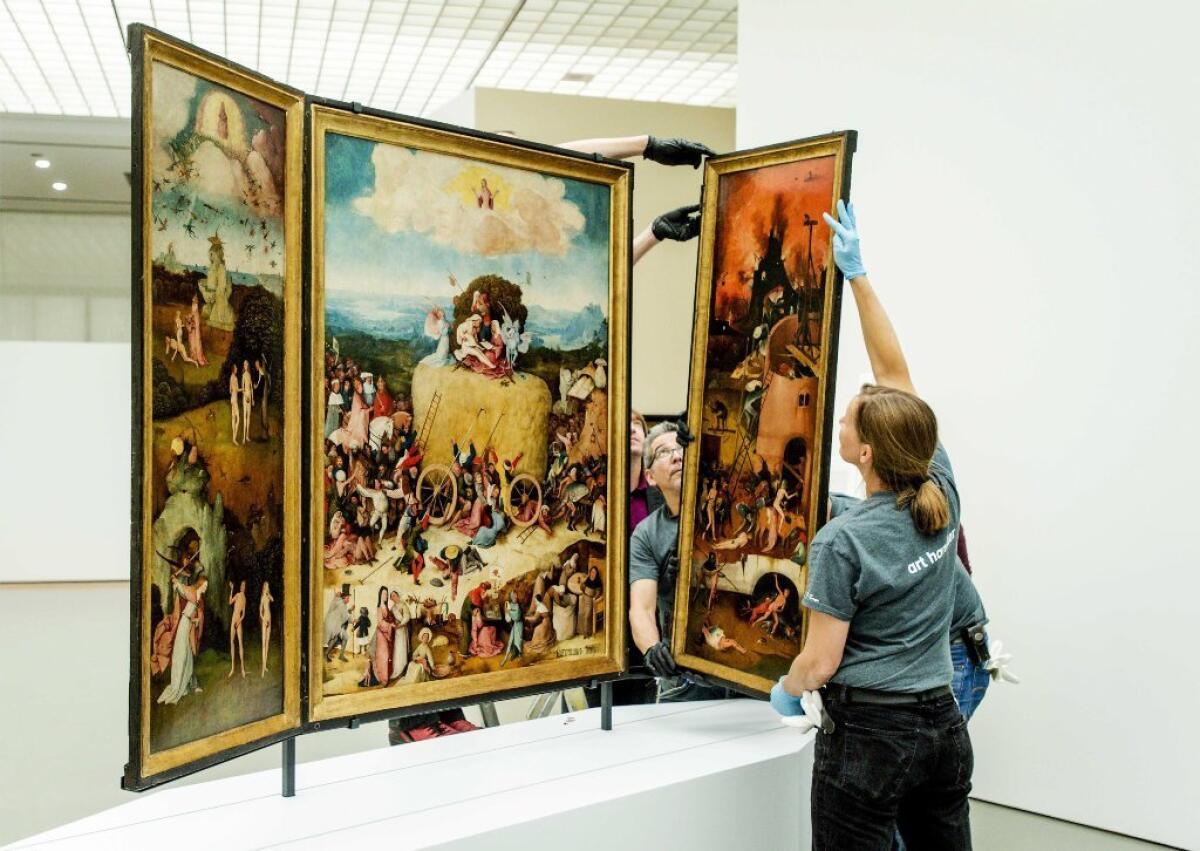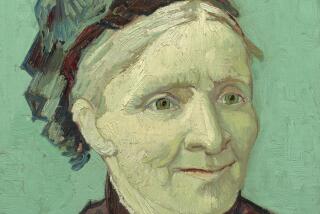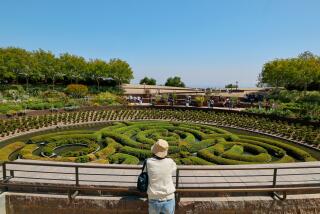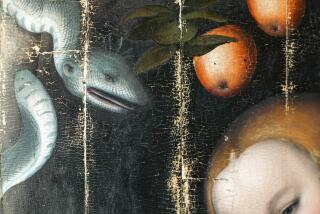The Getty gives an assist to a Hieronymus Bosch blockbuster in the artist’s hometown

A triptych by Hieronymus Bosch being installed at a museum in Rotterdam recently. The same paintings will be on view in a blockbuster Bosch exhibition next year in a municipal museum in the artist’s Dutch hometown of ‘s-Hertogenbosch.
The J. Paul Getty Trust, whose grant-making wing has been the catalyst for the ongoing Pacific Standard Time series of region-wide, multi-exhibition looks at art in Southern California, dialed back the clock a bit and jumped a continent to play a part in a blockbuster art show of 2016: “Hieronymus Bosch: Visions of Genius.”
It opens Feb. 13 at the Noordbrabants Museum in ‘s-Hertogenbosch, Netherlands, the artist’s hometown, to mark the 500th anniversary of his death in 1516.
SIGN UP for the free Essential Arts & Culture newsletter >>
The Noordbrabants, a small municipal museum that has no works by Bosch in its own collection, decided to try to bring it all back home by securing loans of as many Bosch paintings and drawings as it could.
Among the major museums that have jumped onboard are the Louvre in Paris, the Prado in Madrid, the National Gallery of Art in Washington, D.C., and New York’s Metropolitan Museum of Art.
The Getty has no Bosch works to lend, but its grant-making Getty Foundation stepped in with about $410,000 in funding. About half the money helped conserve three key works consisting of multiple wooden panels that are housed in Venice, Italy, at the Gallerie dell’Accadmeia and the Palazzo Grimani.
Updated, Oct. 27, 11:45 a.m.: an earlier version of this post incorrectly said the Getty grant, which was issued in euros, had a value of $250,000.
The paintings were restored so they could safely travel to the three-month show. The rest of the money is for a website that will feature detailed images of nearly 40 Bosch paintings – almost his entire oeuvre in oil.
It will allow scholars and art fans to make close observations and comparisons among works by an artist who painted some beatific visions of holy figures, but has become synonymous with scenes of sinners and the monstrous torments awaiting them.
The British newspaper the Guardian reported recently that the Prado in Madrid was not about to send Bosch’s most famous work, “The Garden of Earthly Delights,” to the exhibition, but that it’s providing a worthy consolation prize, the “Haywain” triptych.
Like “Garden,” it’s a series of three paintings on wooden panels, showing the Garden of Eden on the left, the torments of the damned on the right, and visions of sometimes morally dubious human pursuits in the middle.
The “Haywain” recently went on view at another Dutch museum, the Museum Boijmans Van Beuningan in Rotterdam, having left the Prado for the first time in 450 years. In February it will head on to ‘s-Hertogenbosch for the Bosch birthplace blockbuster.
The works coming from Venice that were restored with the Getty’s help are two triptychs focusing on saints (one of whom is being crucified), and “Four Visions of the Hereafter,” whose panels show the “Fall of the Damned,” “Hell,” “Earthly Paradise” and “Ascent into Heaven.”
The grants from the Getty were part of its $6 million Panel Paintings Initiative that began in 2008 and is now almost finished. The goal was not only to conserve some of the world’s great paintings on wooden panels, but to train a new generation of conservators in the proper care of panel paintings.
Other works in the panel initiative include the Ghent Altarpiece by Jan and Hubert van Eyck, at Saint Bavo Cathedral in Belgium; Albrecht Durer’s “Adam and Eve” diptych at the Prado and Peter Paul Rubens’ “Triumph of the Eucharist,” also at the Prado.
Follow @boehmm of the LA Times for arts news and features
More to Read
The biggest entertainment stories
Get our big stories about Hollywood, film, television, music, arts, culture and more right in your inbox as soon as they publish.
You may occasionally receive promotional content from the Los Angeles Times.











